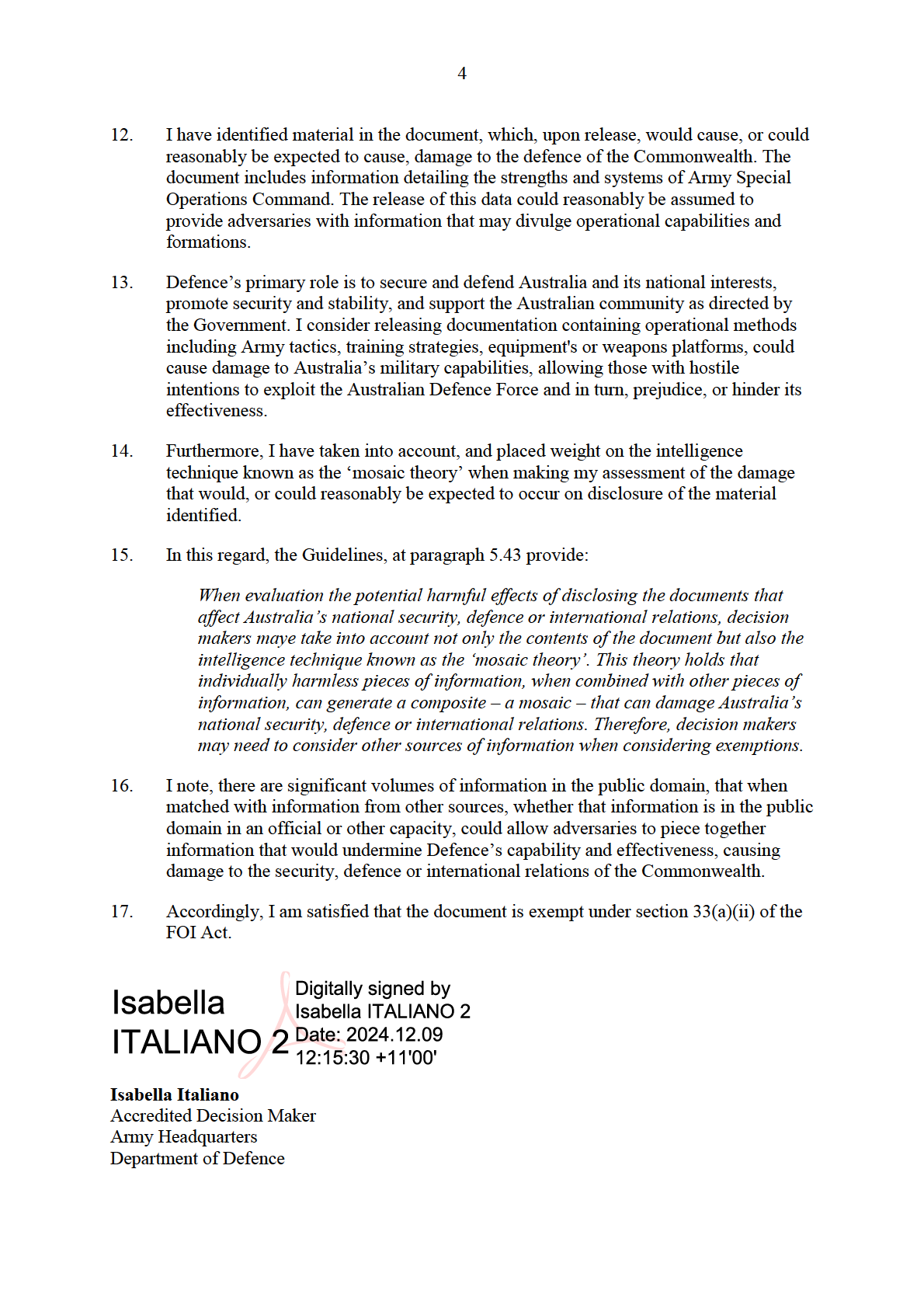
DEFENCE FOI 355/24/25
STATEMENT OF REASONS UNDER THE FREEDOM OF INFORMATION ACT 1982
1.
I refer to the request by John Davis (the applicant), dated and received on
8 November 2024 by the Department of Defence (Defence), for access to the
following documents under the Freedom of Information Act 1982 (Cth) (FOI Act):
“…the LWP-G 0-5-2 Staff Officers Aide-Memoire.”
FOI decision maker
2.
I am the authorised officer pursuant to section 23 of the FOI Act to make a decision on
this FOI request.
Documents identified
3.
I have identified one (1) document as falling within the scope of the request.
Decision
4.
I have decided to refuse access to the document in accordance with section 22 [access
to edited copies with exempt or irrelevant matter deleted] of the FOI Act on the
grounds that the identified document is considered exempt under section 33
[Documents affecting national security, defence or international relations] of the FOI
Act.
Material taken into account
5.
In making my decision, I have had regard to:
a. the terms of the request;
b. the content of the identified document in issue;
c. relevant provisions of the FOI Act;
d. the Guidelines published by the Office of the Australian Information
Commissioner under section 93A of the FOI Act (the Guidelines); and
e. Consultation with Defence HQ Forces Command.
REASONS FOR DECISION
Section 22 – Access to edited copies with exempt or irrelevant matter deleted
6.
Where a decision maker denies access to a document, section 22(1) of the FOI Act
requires that they consider releasing the document with exempt matter deleted, if
possible.
3
7.
Paragraph 3.98 of the Guidelines provides that:
…an agency or minister should take a common sense approach in considering
whether the number of deletions would be so many that the remaining document
would be of little or no value to the applicant.
8.
I have decided to refuse access to the document in full as it would be meaningless and
of little or no value once the exempt material is removed.
Section 33(a) – Documents affecting national security, defence or international relations
9.
Section 33(a)(ii) of the FOI Act states:
A document is an exempt document if disclosure of the document under this Act:
(a) would, or could reasonably be expected to, cause damage to:
(ii) the defence of the Commonwealth
10.
In regard to the terms ‘would, or could reasonably be expected to’ and ‘damage’, the
Guidelines provide:
5.16 The test requires the decision maker to assess the likelihood of the predicted
or forecast event, effect or damage occurring after disclosure of a document.
5.17 The use of the word ‘could’ in this qualification is less stringent than
‘would’, and requires analysis of the reasonable expectation rather than certainty
of an event, effect or damage occurring. It may be a reasonable expectation that
an effect has occurred, is presently occurring, or could occur in the future.
…
5.32 The meaning of ‘damage’ has three aspects:
i. that of safety, protection or defence from something that is regarded as a
danger. The AAT has given financial difficulty, attack, theft and political or
military takeover as examples.
ii. the means that may be employed either to bring about or to protect against
danger of that sort. Examples of those means are espionage, theft,
infiltration and sabotage.
11.
In regard to ‘defence of the Commonwealth’, the Guidelines, at paragraph 5.36, refer
to previous Administrative Appeals Tribunal (AAT) decisions which provide that the
term includes:
a. meeting Australia’s international obligations;
b. ensuring the proper conduct of international defence relations;
c. deterring and preventing foreign incursions into Australian territory; and
d. protecting the Defence Force from hindrance or activities which would
prejudice its effectiveness.


